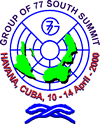
 |
THE GROUP OF 77
|
|
10 April 2000
|
|
Press Release
|
|
IMF,
WORLD BANK POLICIES HAVE “DEBILITATING EFFECT” ON DEVELOPING COUNTRIES,
SAYS CHAIRMAN OF SOUTH SUMMIT IN HAVANA Havana, 10 April—The policies of the international financial institutions are having a “debilitating effect” on the countries of the South, said the Chairman of the “Group of 77”, the 133 developing countries meeting here this week to discuss globalization and North-South relations, among other issues. Speaking at a press conference today, Chief Arthur C.I. Mbanefo, who chairs the G77 in New York this year and is Nigeria’s Permanent Representative to the United Nations, added that, coupled with imbalances in the current international financial architecture, the debt burden is causing a “reversal of development growth”. For example, he said, “the debt servicing costs of some developing countries are double or more than double their total budgets for social services”. The South Summit will be addressing those issues, among others of relevance to the developing world. “We intend to use this first summit of the G77 as an opportunity to revitalize South-South cooperation so as to enable us to address the challenges of globalization in an increasingly knowledge-based society”, stressed Chief Mbanefo. The Summit, which opened today at Havana’s International Conference Center and continues through 14 April, will be the largest gathering ever of heads of state and government from the developing world, with more than 60 such leaders expected to attend. In addition, Chief Mbanefo said, “in a spirit of openness, we have also invited 56 developed countries – including members of the OECD – and 85 international, regional and subregional organizations”. Asked why so much time had elapsed between the Asian financial crisis and the convening of the South Summit, the G77 Chairman replied that it had first been necessary to assess the impact of the crisis, but that “the time has now come to send signals to other developing countries about the lessons to be drawn from the development experience of South-East Asia. In fact, the slow pace at which the crisis unfolded made it important for such lessons to be drawn with great care and thorough understanding, in order to seek remedies through collective efforts”. The problems arising from declining official development assistance and the marginalization of developing countries will also be dealt with at the Summit, in its discussion of North-South relations. To a related question on the reason for the delay in convening a summit of the South at the highest level, Chief Mbanefo responded that today – an era marked by a half-century of the existence of the United Nations, the end of the cold war, and the challenges of globalization – was precisely the “right time to move to the level of heads of state to chart a new course for development”. An “interactive debate” is slated to be held here on Thursday, 13 April, when the political leaders of the third world come together to discuss the four main topics of the Summit: globalization; North-South relations; South-South cooperation; and knowledge and technology. At the Summit, the leaders are expected to adopt two “interdependent” documents: a “visionary” political declaration, and a programme of action containing the methodology and time frame for the implementation of appropriate policies and strategies arising from the declaration, Chief Mbanefo said. ***** For more information, contact the Executive Secretary of the Summit, Mr. Mourad Ahmia, South Summit secretariat, Havana International Conference Center, Room 1105, tel: +537/282.786, fax: +537/288.655; or visit our Web sites: http://www.g77.org or http://www.cumbresur.cu. |